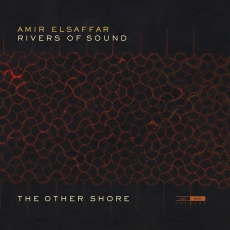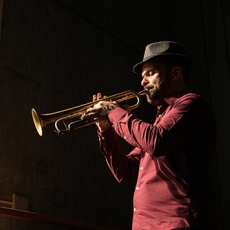Amir ElSaffar & Rivers of Sound - The Other Shore - Jazzword
Expanding his cross-cultural references further, American trumpeter Amir ElSaffar directs his Rivers of Sound orchestra in a suite which liberally mixes sound currents from his Iraqi heritage with sonic surges from elsewhere to reach The Other Shore. Part of the program’s fulfillment is noting not only how instruments from varied cultural backgrounds fit together, but also how they can do so without abandoning characteristic sounds. Additionally most of the eight compositions resemble an aural palimpsest, with Arabic music currents existing underneath the surface even if the thrust is overtly Western.
With the skills of 17 musicians on tap, most of whom play more than one instrument, there isn’t a problem for instance pairing solos from Miles Okazaki’s Jazz-inflected guitar and Tareq Abboushi’s traditional buzuq in the same sequence; or on “Concentric”, ElSaffar shaking out microtonal santur buzzes within the context of Europeanized expressions from the string section. From the start Rock-like percussion beats and big-band reed section work bring out comparisons to film soundtracks. But considering most tracks also encompasses Middle Eastern sounds such as the multi-accented chanting of ElSaffar and others, and timbres from Abboushi’s buzuq, George Ziadeh’s oud, Dena ElSaffar’s jowza, Rajna Swaminathan’ mridangam and Tim Moore’s dumbek, themes often take an Iraqi direction. Occidental orientation permeates tracks like “Reaching Upwards”. Yet those harmonized lyrical variables share space with churning Jazz licks from drummer Nasheet Waits and Ole Mathisen’s cutting tenor saxophone vibrations. Meanwhile the emphasis on ElSaffar’s trumpet, especially when linked with massed percussion agitation appears to have more in common with mariachi than muezzin textures.
Attention put into The Other Shore’s arrangements and interpretations is also obvious. Although the concluding epilogue with oboe vibrating against unison strings may reference notated music’s romantic period. the tonal baggage that affects any expected instrument’s timbre isn’t allowed to predominate. Dena ElSaffar’s slithering violin strokes on “Ashaa” for instance, are as responsible for opening up the tune to dramatic contrasts as guitar twangs, double bass pops, John Escreet’s piano comping and elevated transverse blowing from the reed choir.
Impressively unclassifiable but also eloquently pulsating, the interpretations by Rivers of Sound of ElSaffar’s creations add polychrome musical tints to already considered programs.

